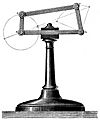Kinematics facts for kids
Kinematics is a part of classical mechanics that studies how things move. It looks at the path, speed, and acceleration of objects, but it doesn't worry about why they are moving. Think of it like describing a dance without knowing who is playing the music!
The word "kinematics" comes from the Greek word kinema, which means "movement" or "motion." So, kinematics is really the "geometry of motion."
Contents
What Kinematics Studies
Kinematics helps us understand how different things move. It looks at:
- The path an object takes.
- Its velocity (how fast it's going and in what direction).
- Its acceleration (how its velocity changes).
It's like drawing a map of an object's journey and noting its speed along the way.
Where Kinematics is Used
Kinematics is used in many exciting fields:
- Space Science: Astrophysics uses kinematics to describe how planets, stars, and galaxies move in space.
- Engineering: In mechanical engineering and robotics, kinematics helps design and understand how machines work. This includes things like how a car engine moves or how a robotic arm reaches for something.
- Biology: Biomechanics uses kinematics to study how the human body moves, like how your arm swings when you walk or how a soccer player kicks a ball.
Understanding Motion with Math
To describe motion, scientists and engineers use mathematical functions. These functions help them predict where an object will be and how fast it will be moving at any given time. For example, they can use math to describe how something rotates or slides.
Analyzing and Designing Movement
Kinematics is used in two main ways in engineering:
- Kinematic Analysis: This is when engineers measure the motion of an existing machine or system. They figure out how much it can move and how its parts interact. For example, they might analyze how far a robotic arm can reach.
- Kinematic Synthesis: This is the opposite! Engineers use kinematics to design new machines or parts that will move in a specific way. If you need a robot arm to pick up an object from a certain spot, kinematic synthesis helps design the arm to do just that.
Kinematics also helps engineers understand the mechanical advantage of a machine. This means figuring out how a machine can make work easier, like how a lever helps you lift a heavy object with less effort.
Images for kids
-
Figure 1: The angular velocity vector Ω points up for counterclockwise rotation and down for clockwise rotation, as specified by the right-hand rule. Angular position θ(t) changes with time at a rate ω(t) = dθ/dt.
See also
 In Spanish: Cinemática para niños
In Spanish: Cinemática para niños
 | Roy Wilkins |
 | John Lewis |
 | Linda Carol Brown |




